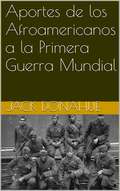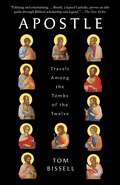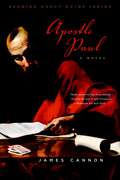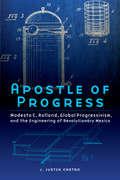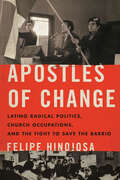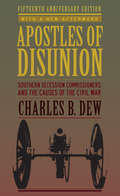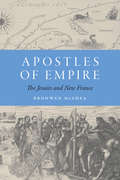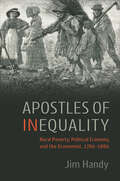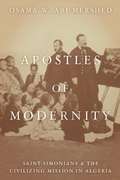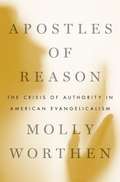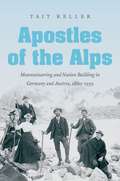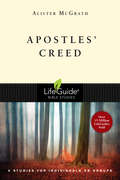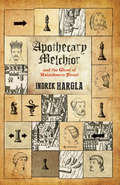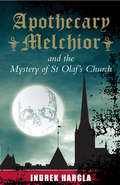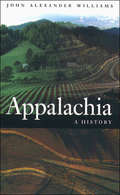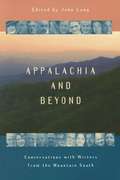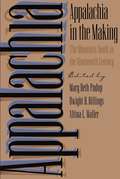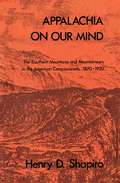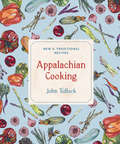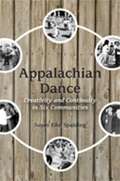- Table View
- List View
Aportes de los Afroamericanos a la Primera Guerra Mundial
by José Pedro Galindo Macías Jack DonahueEl Gobierno de Estados Unidos experimentó por primera vez en tener soldados afroamericanos en la Primera Guerra Mundial. Estos soldados vieron algo en Francia que nunca vieron antes en los Estados Unidos: La libertad incondicional. Podían caminar por las calles con mujeres blancas sin preocuparse de ser linchados, no tenían que comer en lugares específicos en los restaurantes, beber de ciertas fuentes, o sentarse en la parte trasera del autobús.
Apostando al destino (Apostando al amor #Volumen 3)
by A.S. LefebreLlega la tercera entrega de la serie «Apostando al amor». Un amor verdadero, un pasado triste y una apuesta al destino. Elizabeth Jones, después de la desaparición de su esposo y tras encontrar una carta en donde se entera de que su familia materna la buscó por años y está en Inglaterra, decide embarcarse para buscar su destino, a su familia y a su desaparecido esposo. No solo encuentra amigos que la ayudan, sino unos ojos color esmeralda que se convierten en el amor de su vida. Eduardo Rushmore, quien había decidido no casarse nunca al menos por amor, pues quien creía que había sido el amor de su vida era feliz con su familia, una noche, en un baile de máscaras, conoce a una misteriosa dama de acento extranjero. Jura que es un ángel, y queda perdido en su mirada azul claro. Cuando Eduardo llega a creer que su nuevo título es una maldición porque todos insisten en que debe casarse y por otras situaciones más, se encuentra cara a cara con su ángel, ambos se dan cuenta de que su amor es correspondido. Pero ella guarda un secreto: está casada. ¿Podrán ganar su apuesta al destino para al fin poder estar juntos y llevar a cabo su amor?
Apostando en Navidad: Un romance de Regencia en Navidad
by Sandra SookooDescripción del libro: A veces el amor necesita unas cuantas apuestas para mantenerse, la segunda vez. El placer es su única búsqueda… Colin Rowley, Visconde de Hartsforf, ha recibido una oferta demasiado buena para ser ignorada: si el viene a casa, al Hall Lancaster y a su familia para la mañana de Navidad, él ganará un codiciado caballo de carreras, así como una propiedad. El problema está, en que los recuerdos asociados al castillo ducal de su padre lo atormentan, especialmente aquellos que tienen que ver con la primera chica a la que amó, la que lo rechazó. Enfrentada a unas circunstancias reducidas… La viuda Lucy Ashbrook está dejando Londres por última vez. Ahora que los ahorros de su esposo se han acabado, ella ya no puede mantener su estilo de vida, por lo que después de asistir a la fiesta de Navidad en el Hall Lancaster – el lugar de tantos recuerdos deliciosos- ella volverá a vivir con sus padres, en la propiedad vecina. Demasiado malo es que el primer hombre que se ganó su corazón, y que la acompaña en el viaje a Derbyshire, no ha cambiado en sus maneras egoístas. La magia de la época de fiesta… Cuando una serie de misteriosos eventos continuamente, lanzan a Colin y Lucy juntos, ellos no pueden hacer más, que revivir el pasado, y redescubren el gozo que tuvieron durante aquellos inviernos por tantos años atrás. La felicidad los evade a ambos a menos que ellos, encuentren con lo maravilloso de la época navideña y se entreguen a un amor que ha esperado…con la ayuda de unas pocas apuestas secretas de Navidad, trabajando detrás de bastidores.
Apostle
by Tom BissellA profound and moving journey into the heart of Christianity that explores the mysterious and often paradoxical lives and legacies of the Twelve Apostles--a book both for those of the faith and for others who seek to understand Christianity from the outside in. Peter, Matthew, Thomas, John: Who were these men? What was their relationship to Jesus? Tom Bissell provides rich and surprising answers to these ancient, elusive questions. He examines not just who these men were (and weren't), but also how their identities have taken shape over the course of two millennia. Ultimately, Bissell finds that the story of the apostles is the story of early Christianity: its competing versions of Jesus's ministry, its countless schisms, and its ultimate evolution from an obscure Jewish sect to the global faith we know today in all its forms and permutations. In his quest to understand the underpinnings of the world's largest religion, Bissell embarks on a years-long pilgrimage to the supposed tombs of the Twelve Apostles. He travels from Jerusalem and Rome to Turkey, Greece, Spain, France, India, and Kyrgyzstan, vividly capturing the rich diversity of Christianity's worldwide reach. Along the way, he engages with a host of characters--priests, paupers, a Vatican archaeologist, a Palestinian taxi driver, a Russian monk--posing sharp questions that range from the religious to the philosophical to the political. Written with warmth, empathy, and rare acumen, Apostle is a brilliant synthesis of travel writing, biblical history, and a deep, lifelong relationship with Christianity. The result is an unusual, erudite, and at times hilarious book--a religious, intellectual, and personal adventure fit for believers, scholars, and wanderers alike.From the Hardcover edition.
Apostle Paul: A Novel
by James CannonThe iconic Saint Paul - in his lifetime a scholar, prosecutor for the high court of the Jews, accomplice in murder, adventurer, traveler, orator, writer, advocate, and organizer of a new faith - was in fact a Jewish-Hellenistic citizen of the Roman Empire, a man who by the force of his intellect and indomitable will changed the course of history. Eventually he became the leader of the movement that delivered the social and moral authority of Christianity to a pagan world. Given a message - that man and woman had a purpose in earthly life and a future beyond the grave - he carried it first and unsuccessfully to his fellow Jews, then successfully to the gentiles and all mankind. His quality of mind and ability to exhort and persuade, his personal commitment to ethical conduct and values, and his courage and indefatigability made Paul one of the continuing forces in the progress of Western civilization.Author James Cannon has written about political leaders as a journalist, has served with leaders in public life, and has written feature stories while on the staffs of Time and Newsweek. Now he has taken the story of one of the most momentous quests in history and brought it to life with a vitality and immediacy that is at once gripping, informative, and inspiring.
Apostle of Progress: Modesto C. Rolland, Global Progressivism, and the Engineering of Revolutionary Mexico (The Mexican Experience)
by J. Justin CastroFrom the late nineteenth century to the middle of the twentieth century, Mexico experienced major transformations influenced by a global progressive movement that thrived during the Mexican Revolution and influenced Mexico’s development during subsequent governments. Engineers and other revolutionary technocrats were the system builders who drew up the blueprints, printed newspapers, implemented reforms, and constructed complexity—people who built modern Mexico with an eye on remedying long-standing problems through social, material, and infrastructural development during a period of revolutionary change. In Apostle of Progress J. Justin Castro examines the life of Modesto C. Rolland, a revolutionary propagandist and a prominent figure in the development of Mexico, to gain a better understanding of the role engineers played in creating revolution-era policies and the reconstruction of the Mexican nation. Rolland influenced Mexican land reform, petroleum development, stadium construction, port advancements, radio broadcasting, and experiments in political economy. In the telling of Rolland’s story, Castro offers a captivating account of the Mexican Revolution and the influence of global progressivism on the development of twentieth-century Mexico.
Apostle: Travels Among the Tombs of the Twelve
by Tom BissellA profound and moving journey into the heart of Christianity that explores the mysterious and often paradoxical lives and legacies of the Twelve Apostles—a book both for those of the faith and for others who seek to understand Christianity from the outside in.“Expertly researched and fascinating… Bissell is a wonderfully sure guide to these mysterious men.… This is a serious book about the origins of Christianity that is also very funny. How often can you say that?” —The Independent Peter, Matthew, Thomas, John: Who were these men? What was their relationship to Jesus? Tom Bissell provides rich and surprising answers to these ancient, elusive questions. He examines not just who these men were (and weren’t), but also how their identities have taken shape over the course of two millennia. Ultimately, Bissell finds that the story of the apostles is the story of early Christianity: its competing versions of Jesus’s ministry, its countless schisms, and its ultimate evolution from an obscure Jewish sect to the global faith we know today in all its forms and permutations. In his quest to understand the underpinnings of the world’s largest religion, Bissell embarks on a years-long pilgrimage to the supposed tombs of the Twelve Apostles. He travels from Jerusalem and Rome to Turkey, Greece, Spain, France, India, and Kyrgyzstan, vividly capturing the rich diversity of Christianity’s worldwide reach. Along the way, he engages with a host of characters—priests, paupers, a Vatican archaeologist, a Palestinian taxi driver, a Russian monk—posing sharp questions that range from the religious to the philosophical to the political. Written with warmth, empathy, and rare acumen, Apostle is a brilliant synthesis of travel writing, biblical history, and a deep, lifelong relationship with Christianity. The result is an unusual, erudite, and at times hilarious book—a religious, intellectual, and personal adventure fit for believers, scholars, and wanderers alike.From the Hardcover edition.
Apostles of Change: Latino Radical Politics, Church Occupations, and the Fight to Save the Barrio
by Felipe HinojosaThis “important and well-researched” study of 1960s urban Latino activism and religion is “brimming with the ideas and voices of . . . Latinx activists” (Llana Barber, author of Latino City).In the late 1960s, American cities found themselves in steep decline, with poor and working-class families hit the hardest. Many urban religious institutions debated whether to move to the suburbs. Against the backdrop of the Black and Brown Power movements, which challenged economic inequality and white supremacy, young Latino radicals began occupying churches and disrupting services to compel church communities to join their protests against urban renewal, poverty, police brutality, and racism.Apostles of Change tells the story of these occupations and establishes their context within the urban crisis. It underscores the tensions they created and the activists’ bold, new vision for the church and the world. Through case studies from Chicago, Los Angeles, New York City, and Houston, Felipe Hinojosa reveals how Latino freedom movements crossed the boundaries of faith and politics. He argues that understanding these radical politics is essential to understanding the dynamic changes in Latino religious groups from the late 1960s to the early 1980s.
Apostles of Change: Latino Radical Politics, Church Occupations, and the Fight to Save the Barrio
by Felipe HinojosaThis “important and well-researched” study of 1960s urban Latino activism and religion is “brimming with the ideas and voices of . . . Latinx activists” (Llana Barber, author of Latino City).In the late 1960s, American cities found themselves in steep decline, with poor and working-class families hit the hardest. Many urban religious institutions debated whether to move to the suburbs. Against the backdrop of the Black and Brown Power movements, which challenged economic inequality and white supremacy, young Latino radicals began occupying churches and disrupting services to compel church communities to join their protests against urban renewal, poverty, police brutality, and racism.Apostles of Change tells the story of these occupations and establishes their context within the urban crisis. It underscores the tensions they created and the activists’ bold, new vision for the church and the world. Through case studies from Chicago, Los Angeles, New York City, and Houston, Felipe Hinojosa reveals how Latino freedom movements crossed the boundaries of faith and politics. He argues that understanding these radical politics is essential to understanding the dynamic changes in Latino religious groups from the late 1960s to the early 1980s.
Apostles of Disunion: Southern Secession Commissioners and the Causes of the Civil War (A Nation Divided: Studies in the Civil War Era)
by Charles B. DewIn late 1860 and early 1861, state-appointed commissioners traveled the length and breadth of the slave South carrying a fervent message in pursuit of a clear goal: to persuade the political leadership and the citizenry of the uncommitted slave states to join in the effort to destroy the Union and forge a new Southern nation.Directly refuting the neo-Confederate contention that slavery was neither the reason for secession nor the catalyst for the resulting onset of hostilities in 1861, Charles B. Dew finds in the commissioners' brutally candid rhetoric a stark white supremacist ideology that proves the contrary. The commissioners included in their speeches a constitutional justification for secession, to be sure, and they pointed to a number of political "outrages" committed by the North in the decades prior to Lincoln's election. But the core of their argument--the reason the right of secession had to be invoked and invoked immediately--did not turn on matters of constitutional interpretation or political principle. Over and over again, the commissioners returned to the same point: that Lincoln's election signaled an unequivocal commitment on the part of the North to destroy slavery and that emancipation would plunge the South into a racial nightmare.Dew's discovery and study of the highly illuminating public letters and speeches of these apostles of disunion--often relatively obscure men sent out to convert the unconverted to the secessionist cause--have led him to suggest that the arguments the commissioners presented provide us with the best evidence we have of the motives behind the secession of the lower South in 1860-61.Addressing topics still hotly debated among historians and the public at large more than a century after the Civil War, Dew challenges many current perceptions of the causes of the conflict. He offers a compelling and clearly substantiated argument that slavery and race were absolutely critical factors in the outbreak of war--indeed, that they were at the heart of our great national crisis.
Apostles of Empire: The Jesuits and New France (France Overseas: Studies in Empire and Decolonization)
by Bronwen McSheaApostles of Empire is a revisionist history of the French Jesuit mission to indigenous North Americans in the seventeenth and eighteenth centuries, offering a comprehensive view of a transatlantic enterprise in which secular concerns were integral. Between 1611 and 1764, 320 Jesuits were sent from France to North America to serve as missionaries. Most labored in colonial New France, a vast territory comprising eastern Canada and the Great Lakes region that was inhabited by diverse Native American populations. Although committed to spreading Catholic doctrines and rituals and adapting them to diverse indigenous cultures, these missionaries also devoted significant energy to more-worldly concerns, particularly the transatlantic expansion of the absolutist-era Bourbon state and the importation of the culture of elite, urban French society. In Apostles of Empire Bronwen McShea accounts for these secular dimensions of the mission’s history through candid portraits of Jesuits engaged in a range of secular activities. We see them not only preaching and catechizing in terms that borrowed from indigenous idioms but also cultivating trade and military partnerships between the French and various Indian tribes. Apostles of Empire contributes to ongoing research on the Jesuits, New France, and Atlantic World encounters, as well as on early modern French society, print culture, Catholicism, and imperialism. McShea shows how the Jesuits’ robust conceptions of secular spheres of Christian action informed their efforts from both sides of the Atlantic to build up a French and Catholic empire in North America through significant indigenous cooperation.
Apostles of Inequality: Rural Poverty, Political Economy, and the Economist, 1760–1860
by Jim HandyBetween 1760 and 1860, the English countryside was subject to constant attempts at agricultural improvement. Most often these meant depriving cottagers and rural workers of access to land they could cultivate, despite evidence that they were the most productive farmers in a country constantly short of food. Drawing from a wide range of contemporary sources, Apostles of Inequality argues that such attempts, driven by a flawed faith in the wonders of capital, did little to increase agricultural productivity and instead led to a century of increasing impoverishment in rural England. Jim Handy rejects the assertions about the benefits that accompanied the transition to "improved" agriculture and details the abundant evidence for the efficiency of smallholder, peasant agriculture. He traces the development of both economic theory and government policy through the work of agricultural improver Arthur Young (1741–1820), government advisor Nassau William Senior (1790–1864), and the editors and writers of the Economist, as well as Adam Smith and Thomas Robert Malthus. Apostles of Inequality demonstrates how a fascination with capital – promoted by political economy and farmers’ desires to have a labour force completely dependent on wage labour – fostered widespread destitution in rural England for over a century.
Apostles of Modernity: Saint-Simonians and the Civilizing Mission in Algeria
by Osama Abi-MershedInfluenced by the teachings of philosopher Henri de Saint-Simon (1760-1825), says Ali-Mershed (history, Georgetown U.), France's military Arabists making colonial policy for Algeria from 1830 to 1870 opposed native assimilation, and promoted what they called controlled association with the Muslims. Following him, they contested the existence of primordial human racial and cultural racial and cultural characteristics, he explains, and insisted that societies at different stages of historical development should evolve within their particular institutional structures and cultural traditions. He describes how their discretionary control over the Arab territories provided them a human laboratory for their experiments with Saint-Simonian reforms, and the geographic space to erect a semi-autonomous and protected Arab Kingdom. Annotation ©2010 Book News, Inc., Portland, OR (booknews.com)
Apostles of Reason: The Crisis of Authority in American Evangelicalism
by Molly WorthenEvangelical Christianity is a paradox. Evangelicals are radically individualist, but devoted to community and family. They believe in the transformative power of a personal relationship with God, but are wary of religious enthusiasm. They are deeply skeptical of secular reason, but eager to find scientific proof that the Bible is true. <P> In this groundbreaking history of modern American evangelicalism, Molly Worthen argues that these contradictions are the products of a crisis of authority that lies at the heart of the faith. Evangelicals have never had a single authority to guide them through these dilemmas or settle the troublesome question of what the Bible actually means. Worthen chronicles the ideological warfare, institutional conflict, and clashes between modern gurus and maverick disciples that lurk behind the more familiar narrative of the rise of the Christian Right. The result is an ambitious intellectual history that weaves together stories from all corners of the evangelical world to explain the ideas and personalities-the scholarly ambitions and anti-intellectual impulses-that have made evangelicalism a cultural and political force.<P> In Apostles of Reason, Worthen recasts American evangelicalism as a movement defined not by shared doctrines or politics, but by the problem of reconciling head knowledge and heart religion in an increasingly secular America. She shows that understanding the rise of the Christian Right in purely political terms, as most scholars have done, misses the heart of the story. The culture wars of the late twentieth century emerged not only from the struggle between religious conservatives and secular liberals, but also from the civil war within evangelicalism itself-a battle over how to uphold the commands of both faith and reason, and how ultimately to lead the nation back onto the path of righteousness.
Apostles of the Alps
by Tait KellerThough the Alps may appear to be a peaceful place, the famed mountains once provided the backdrop for a political, environmental, and cultural battle as Germany and Austria struggled to modernize. Tait Keller examines the mountains' threefold role in transforming the two countries, as people sought respite in the mountains, transformed and shaped them according to their needs, and over time began to view them as national symbols and icons of individualism. In the mid-nineteenth century, the Alps were regarded as a place of solace from industrial development and the stresses of urban life. Soon, however, mountaineers, or the so-called apostles of the Alps, began carving the crags to suit their whims, altering the natural landscape with trails and lodges, and seeking to modernize and nationalize the high frontier. Disagreements over the meaning of modernization opened the mountains to competing agendas and hostile ambitions. Keller examines the ways in which these opposing approaches corresponded to the political battles, social conflicts, culture wars, and environmental crusades that shaped modern Germany and Austria, placing the Alpine borderlands at the heart of the German question of nationhood.
Apostles' Creed (LifeGuide Bible Studies)
by Alister McGrath"I believe in God the Father, Almighty, Maker of heaven and earth." This six-session LifeGuide Bible Study, based on Alister McGrath's book I Believe, introduces us to the Apostles' Creed and the essential truths about God the Father, the person and work of Jesus Christ, and the Holy Spirit. Christians indeed trust in God, and the basics of our faith have remained the same for centuries. These truths are summarized in historic church documents known as creeds. The Apostles' Creed is an ideal starting point for this vital process of consolidating our grasp of the faith. For over three decades LifeGuide Bible Studies have a provided solid biblical content and raised thought-provoking questions—making for a one-of-a-kind Bible study experience for individuals and groups. This series has more than 130 titles on Old and New Testament books, character studies, and topical studies.
Apothecary Melchior and the Ghost of Rataskaevu Street
by Indrek HarglaTallinn, 1419. What links the Keeper of the Tower, a prostitute and a Flemish painter to a haunted house on Rataskaevu Street? All three claim to have seen a ghost near the house, and each is found dead soon afterwards. Melchior Wakenstede, apothecary and assistant bailiff, is charged with unearthing the truth. With a cultivated sense for justice, Melchior investigates the deaths and attempts to find out whether, as the denizens of medieval Tallinn believe, ghosts can reap their revenge upon the living. When a powerful merchant dies, Melchior perceives a corporeal connection between this and the other deaths. As Melchior becomes embroiled in the conflicts and rivalries between religious orders, merchant guilds and Teutonic Knights, all vying with one another for control of the town, what he discovers is more incredible and more terrible than any ghost.
Apothecary Melchior and the Mystery of St Olaf's Church
by Indrek HarglaThe first in a series of books that have taken Europe by storm and are soon to be filmed, featuring a chemist-turned-sleuth who battles ignorance and superstition--as well as killers--in a beautiful setting and in a gripping and mysterious era of historyThe Apothecary Melchior series plunges the reader into 15th-century Tallinn when Estonia is at the edge of Christian lands and the last foothold before the East: a town of foreign merchants and engineers, dominated by the mighty castle of Toompea and the construction of St Olaf's Church, soon to become the tallest building in the world. Apothecary Melchior is a divisive figure in the town: respected for his arcane knowledge and scientific curiosity but also slightly feared for his mystical witch-doctor aura. When a mysterious murder occurs in the castle, Melchior is called in to help find the killer and reveals a talent for detection. But Tallinn has a serial killer in its midst, and Melchior is tested to the limit in a plot with as many twists and turns as the turreted castle itself. Melchior uncovers a mystery surrounding St Olaf's and a secret society that has been controlling the town for years, uncovering truths about the town that may spell danger.
Appalachia
by John Alexander WilliamsInterweaving social, political, environmental, economic, and popular history, John Alexander Williams chronicles four and a half centuries of the Appalachian past. Along the way, he explores Appalachia's long-contested boundaries and the numerous, often contradictory images that have shaped perceptions of the region as both the essence of America and a place apart.Williams begins his story in the colonial era and describes the half-century of bloody warfare as migrants from Europe and their American-born offspring fought and eventually displaced Appalachia's Native American inhabitants. He depicts the evolution of a backwoods farm-and-forest society, its divided and unhappy fate during the Civil War, and the emergence of a new industrial order as railroads, towns, and extractive industries penetrated deeper and deeper into the mountains. Finally, he considers Appalachia's fate in the twentieth century, when it became the first American region to suffer widespread deindustrialization, and examines the partial renewal created by federal intervention and a small but significant wave of in-migration. Throughout the book, a wide range of Appalachian voices enlivens the analysis and reminds us of the importance of storytelling in the ways the people of Appalachia define themselves and their region.
Appalachia and Beyond: Conversations with Writers From the Mountain South
by John LangThe last quarter-century has seen a remarkable outpouring of fiction and poetry from southern Appalachia--a surge of creativity that has formed an integral part of a larger, and still growing, regional self-consciousness. This book charts the course of this literary renaissance through twenty-one interviews with contemporary Appalachian writers, conversations conducted between 1983 and 2003 at Emory & Henry College's annual literary festival and originally printed in the Iron Mountain Review. The authors interviewed range from nationally known figures such as Fred Chappell, Robert Morgan, Lee Smith, Mary Lee Settle, and Charles Wright to less prominent, though no less gifted, writers like George Ella Lyon, Jo Carson, and George Scarborough. Many of the interviewers are themselves creative writers or Appalachian studies scholars, as well as longtime friends of the interviewees. For example, Jim Wayne Miller interviews James Still; Loyal Jones interviews Jim Wayne Miller; Richard Marius interviews Wilma Dykeman; George Garrett interviews David Huddle; and Michael Chitwood interviews Michael McFee. These wide-ranging conversations address such topics as formative experiences in the author's childhood, major literary influences, the author's educational background and mentors, the writing process, the limitations imposed by such labels as "Appalachian writer," and the broadening scope of literature originating in the Appalachian region. Collectively, these interviews confirm the judgment of some observers that writers from the mountain South are now playing a much larger role in southern letters than in previous periods, thus constituting a "renaissance within a renaissance."
Appalachia in the Making
by Dwight B. Billings Mary Beth Pudup Altina L. WallerAppalachia first entered the American consciousness as a distinct region in the decades following the Civil War. The place and its people have long been seen as backwards and 'other' because of their perceived geographical, social, and economic isolation. These essays, by fourteen eminent historians and social scientists, illuminate important dimensions of early social life in diverse sections of the Appalachian mountains. The contributors seek to place the study of Appalachia within the context of comparative regional studies of the United States, maintaining that processes and patterns thought to make the region exceptional were not necessarily unique to the mountain South. The contributors are Mary K. Anglin, Alan Banks, Dwight B. Billings, Kathleen M. Blee, Wilma A. Dunaway, John R. Finger, John C. Inscoe, Ronald L. Lewis, Ralph Mann, Gordon B. McKinney, Mary Beth Pudup, Paul Salstrom, Altina L. Waller, and John Alexander Williams
Appalachia on Our Mind
by Henry D. ShapiroAppalachia on Our Mind is not a history of Appalachia. It is rather a history of the American idea of Appalachia. The author argues that the emergence of this idea has little to do with the realities of mountain life but was the result of a need to reconcile the "otherness" of Appalachia, as decribed by local-color writers, tourists, and home missionaries, with assumptions about the nature of America and American civilization.Between 1870 and 1900, it became clear that the existence of the "strange land and peculiar people" of the southern mountains challenged dominant notions about the basic homogeneity of the American people and the progress of the United States toward achiving a uniform national civilization. Some people attempted to explain Appalachian otherness as normal and natural -- no exception to the rule of progress. Others attempted the practical integration of Appalachia into America through philanthropic work. In the twentieth century, however, still other people began questioning their assumptions about the characteristics of American civilization itself, ultimately defining Appalachia as a region in a nation of regions and the mountaineers as a people in a nation of peoples.In his skillful examination of the "invention" of the idea of Appalachia and its impact on American thought and action during the early twentieth century, Mr. Shapiro analyzes the following: the "discovery" of Appalachia as a field for fiction by the local-color writers and as a field for benevolent work by the home missionaries of the northern Protestant churches; the emergence of the "problem" of Appalachia and attempts to solve it through explanation and social action; the articulation of a regionalist definition of Appalachia and the establishment of instituions that reinforced that definition; the impact of that regionalistic definition of Appalachia on the conduct of systematic benevolence, expecially in the context of the debate over child-labor restriction and the transformation of philanthropy into community work; and the attempt to discover the bases for an indigenous mountain culture in handicrafts, folksong, and folkdance.
Appalachia: The Voices of Sleeping Birds
by Cynthia RylantFrom the book: IN A CERTAIN PART of the country called Appalachia you will find dogs named Prince or King living in little towns with names like Coal City and Sally's Backbone. These dogs run free, being country dogs, and their legs are full of muscles from running rabbits up mountains or from following boys who push old bikes against the hill roads they call hollows. These are mostly good dogs and can be trusted. The owners of these dogs who live in Appalachia have names like Mamie and Boyd and Oley, and they probably have lived in Appalachia all of their lives. Many of them were born in coal camps in tiny houses which stood on poles and on the sides of which you could draw a face with your finger because coal dust had settled on their walls like snow.
Appalachian Cooking: New And Traditional Recipes
by John TullockMore than 100 recipes from Southern Appalachia's culinary renaissance The southern Appalachian Mountains are rich with produce, including wild ramps, corn, berries, and black walnuts. Drawing from these natural resources and fusing traditions of Native Americans and Scots-Irish settlers, the people of the region have developed a unique way of cooking. These foodways run in John Tullock’s blood. As a child growing up on an East Tennessee farm, Tullock helped his grandmother make biscuits and can pickles, and walked to town with his grandfather to trade fresh eggs for coffee. In Appalachian Cooking, he shares these memories and recipes passed down over generations, as well as modern takes on classic dishes. Recipes include: Sweet Onion Upside-Down Corn Bread Fried Green Tomatoes Skillet Braised Pork Chops Blackberry Crumble Vibrant watercolor illustrations throughout remind us that beautiful produce is often the best culinary inspiration.
Appalachian Dance: Creativity and Continuity in Six Communities
by Susan Eike SpaldingIn Appalachian Dance, Susan Eike Spalding employs twenty-five years' worth of rich interviews with black and white Virginians, Tennesseeans, and Kentuckians to explore the evolution and social uses of dance practices in each region. Spalding analyzes how issues as disparate as industrialization around coal, race relations, and the 1970s folk revival profoundly influenced freestyle clogging and other dance forms. She reveals how African Americans and Native Americans, as well as European immigrants drawn to the timber mills and coal fields, added to local dance vocabularies. By placing each community in its sociopolitical and economic context, Spalding explores how the formal and stylistic nuances found in Appalachian dance reflect the beliefs, shared understandings, and experiences of the community at large.
